Written by Joe Ballenger
I think this is a really neat question for many reasons. Getting older is something we all deal with, and the person you were 5 years ago is not the person you are today. For everything our life begins, we grow, we develop and then we die. After seeing shed skins, learning about butterflies, or reading about the horrors of parasitoids, people are aware that insect development is most unlike our own. Regardless of whether you emerged from an egg, or survived live birth, we all inevitably meet the same fate.
Almost every living thing dies…so how do insects die?
Do insects die of old age?
Yes! Insects do die of old age.
Being alive is a process which is subject to chaos, and the body can only keep going for so long. Even bacterial cells have evidence of aging and after division, one divided cell is different than the other because components are not evenly divided amongst cells. There are only a few animals (some jellyfish) which are immortal.

It’s been a few years underground, but I made it! And then I’ll die in a few weeks.
T. Nathan Mundhenk – Wikimedia Commons
Although most insects live less than a year (not including dormant stages), there are some surprisingly long-lived insects. Defining ‘longest lived’ is complicated because there are a lot of insects which can go dormant in harsh environments, and some insects have castes which are short-lived.
Insect development can slow down when they’re feed a poor diet. For example, some wood feeding beetles appear to take decades to develop after their tree is turned into furniture. Some species of cicadas are famous for their 17 year life cycles, and these guys take that long because they feed on nutrient-poor tree liquids. To put this in perspective, a cicada could live underground, sipping on tree juice, not moving, from the moment I was born, to the time I graduated high school.
Even mayflies, famous for their short-lived adult lifespans, can actually take a couple years to develop before emerging as adults depending on environmental conditions. The longest lived adult insects are queen ants, with some thought to live between 25 to 50 years. Workers, in most species, die after a few months.
Although some insects do die of old age in the wild, nature is harsh. Most freeze to death, overheat, starve or become someone’s lunch. Insects who die of old age are lucky, and they combat high mortality rates by making lots of babies.
Looking at how insects age is something best evaluated in captivity. So let’s take a look!
What happens when insects get old in captivity?
A lot of this section is derived from my experiences rearing insects, and I’ve done a lot of this over the years.
Butterflies, moths and cockroaches
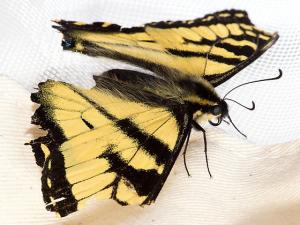
Tiger swallowtail showing age related wing damage. Picture courtesy of Mardon Erbland from Bugguide.
When an insect becomes an adult, it stops shedding it’s skin. In earlier stages, injuries can heal and will be largely gone by the next molt. Most insects can even regenerate limbs after moulting. However when the insect stops shedding, a large chunk of (but not the entirety of) the healing process stops as well.
Because limbs and wings aren’t replaced, damage occurred from normal wear and tear will build up and become more obvious as time goes on. The oldest insects, like the Swallowtail butterfly shown to the left, often have wings which are damaged to the point where flight becomes difficult. While the insect might not die of old age per se, it’s likely that something will come along and make an easy meal of it.
Honeybees
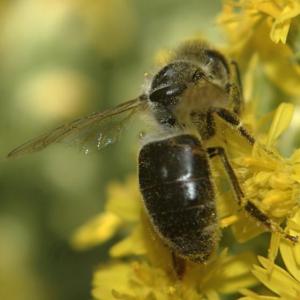
Old honeybee, picture courtesy of Jerry Friedman from BugGuide.net.
Honeybees do show signs of aging similar to butterflies, moths and cockroaches. Their wings become chipped in very much the same way. The thin layer of hair on their bodies also gets rubbed off after a few months of entering and exiting the hive, and snuggling with their sisters between food-runs.
The behavior of the worker honeybee also changes as they age. After becoming adults, they start out as nurse bees, babysitting and take care of the young. After this, they become housekeepers, and begin cleaning the hive, repairing comb, and taking care of pests the best they can. They are then promoted to foragers, and brave the elements as intrepid explorers. They search for pollen and bring resources back to the hive. During their last days, the bees begin aggressively guarding the hive and presumably shout things like “Get off my lawn you whippersnappers!!” In fact, a good chunk of the bees I’ve been stung by were bald…they were completely black like the one in the picture above.
Mantids, Assassin bugs, and Mealworms
Other insects don’t show readily apparent signs of aging. Once the animal reaches
adulthood, you can’t look at them and easily tell the young animals from the old animals like you can for butterflies and bees. Mantids, assassin bugs, and some beetles (but not all beetles) are this way. The mantids and native assassin bugs I’ve kept exhibited a pretty slow decline. They started moving slower, and began to have trouble catching prey. Egg-laying stopped soon after, and one day they ended up dead in their cage.
It’s important to note that I don’t think mantids or assassin bugs ever die of old age in the wild, because I have kept these animals long after the weather was cold enough to be inhospitable. In fact, most insects stop appearing after the first hard frost and don’t get the chance to die of old age.
What makes insects die of old age?
There are many things that happen when we get old. Physical and chemical wear and tear degrade the body. Balding and wing damage, exhibited above, can be as easily survived by the insects as your grandmother enduring her wrinkly skin or your dad enduring his bald spot.

A bald spot can be survived, but Donald Trump hides his like a video game weak spot. Image via Wikimedia commons.
So why do insects die of old age?
Unless you’re looking really closely, most of the damage from old age is unseen in insects. Biochemical components become damaged from metabolic byproducts called ‘free radicals‘ produced as a result of using oxygen in metabolism. Those free radicals damage DNA, which causes mutations which become apparent later in life. The free radicals also create compounds (like lipofuscin) insects can’t metabolize. Although there are recycling and repair mechanisms, this damage eventually builds up and results in a decrease in the ability of cells to function and an increase in cell death. We suffer from this, too which is why a lot of companies push antioxidant foods.
Insects and humans share a lot of genes, which makes them a great model for aging. There’s a lot which isn’t understood, but it’s known that metabolism is the most important process in regulating how long insects actually live.
A lot of the genes which regulate longevity are involved in a process called insulin-like-peptide signaling, which is regulated by several different factors (most famously the FOXO transcription factors). The regulatory system of components related to aging is really, really complicated…but old-age damage is largely the result of a combination between declining cellular regeneration systems, and a buildup of damage from metabolic byproducts. It’s not unlike a car engine, where physical wear and tear take their told while stubborn byproducts jam up the systems.
How do insects finally die?
If insects are kept in a cage, and shielded from predators, diseases, and the elements, I would presume that the main cause of death is probably dehydration more often than not. They often become too weak to procure food and water for themselves, and this is often the point of no return. Once the insect can’t feed itself, there’s nothing which can keep it alive.
The bottom line?
Insects die for a variety of reasons, but usually not from old age. Many insects show signs of wear and tear because they lose the ability to heal certain structures , and this can make them easy targets. Other insects may show no outward signs of aging. Eventually the insects do become weak and unable to procure food or water for themselves, and death most likely comes from dehydration or starvation for most insect species.

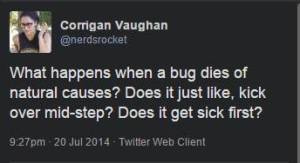
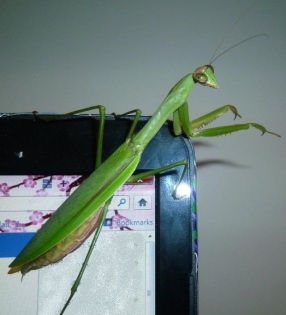
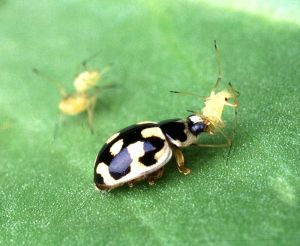
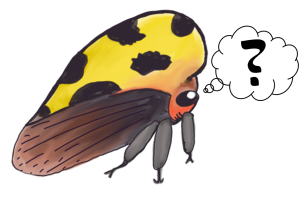
Can you discuss in a follow up post, the short life span of adult Saturniids, or other adult insects, which don’t even have mouth parts, so can’t eat. Does raising them in captivity, deprived of their one function to mate, have an impact (positive or negative) in their relatively short life spans?
LikeLiked by 1 person
Pingback: Snapshot 01.14.15 | Little Big
I think Joe is going to cover this in a follow up post =)
LikeLike
Hey, Ray…there are some trade-offs between feeding and fecundity. Insects with no mouthparts tend to be shorter lived, and there are some trade-offs between successful reproduction and fecundity in other insects.
However, I’m not sure about the specifics of how this works in non-feeding insects…or Saturniid silk moths in particular.
This question has been added to our queue, and I’ll look into it.
LikeLike
Thanks, Joe. Will look forward to it.
LikeLike
Do damselflies or mayflies bother butterflies?
I have a female monarch that can’t fly due to a missing wing – so I have been keeping her inside unless I am with her (near open screened windows so she can feel the sun and fresh air) but I have a damselfly (I think) that got into the house and I can’t catch him to put him/her outside and am worried that he will be a danger to her?
LikeLike